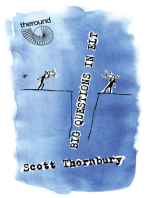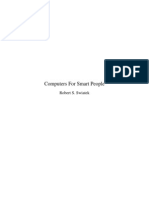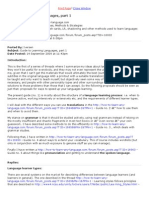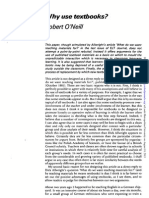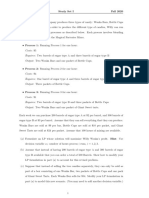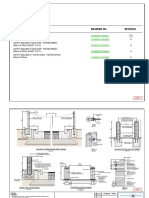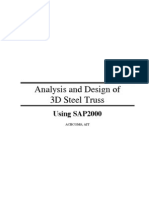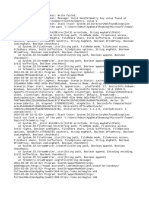Making of The Lexham High Definition New Testament PDF
Making of The Lexham High Definition New Testament PDF
Uploaded by
Jacob BullockCopyright:
Available Formats
Making of The Lexham High Definition New Testament PDF
Making of The Lexham High Definition New Testament PDF
Uploaded by
Jacob BullockOriginal Title
Copyright
Available Formats
Share this document
Did you find this document useful?
Is this content inappropriate?
Copyright:
Available Formats
Making of The Lexham High Definition New Testament PDF
Making of The Lexham High Definition New Testament PDF
Uploaded by
Jacob BullockCopyright:
Available Formats
Logos Bible Software Blog: Making of the Lexham High Definition New Testament Page 1 of 4
February 07, 2008
Making of the Lexham High Definition New Testament
[Today's guest post is from Dr. Steve Runge, a scholar-in-residence at Logos Bible Software, whose work
focuses on the discourse grammar of Hebrew and Greek.]
This is a follow-up to a blog entry that I posted last Thursday entitled Who
Cares About Participles? I Do! It described how the New Testament writers
used Greek participles to push less-important action into the background in
order to keep attention focused on the main action of a verse. At the end, I
gave the warning that this principle about backgrounding action did not apply
to every participle. This prompted a great comment from a user. He said:
I wasn'
t the best student at English grammar either so to figure out that
what you have shown us in this blog would have been impossible for
me as I don'
t understand all the different parts of English speech and
writing. So, my question is this: with my ineptitude with both Greek and
English, how can I use this tool well and know even what to look for?
Perhaps that is an impossible question to ask.
This is a great question. The reality is there is no possible way for him to have
known or done what I did without knowing the grammatical principles I used. Even knowing the principle, he
would still need enough grammatical background to do the analysis. In other words, he wants access to this
information, but his grammatical skills are too rusty for him to do the analysis himself. On top of this, he was
probably never taught this principle in his studies. If you read the participles blog post and are a few years out of
school, you will probably empathize with his frustration. Maybe you never even had the chance to attend Bible
school. Here are some questions.
1. Were you able to understand the idea of '
backgrounding'the action in a sentence using participles?
2. Did you understand the meaning that could be gleaned from the choice to use a participle, and not a finite
verb?
If so, then the problem is not with your understanding of grammar, the problem is with your access to the
analyzed data. Right now, there is no access without years of study, and in this users case, keeping his Greek
skills fresh, right? My personal mission in life is to address the ACCESS issue.
I have spent the last 12 years studying the problem, proposing and testing solutions, and coming up with a plan.
What if ALL of the backgrounded actions in the NT were identified? What if there were a visual-filter type label on
them so that as you were reading the text you could distinguish main actions from backgrounded ones? Would
that be helpful? What if I did the same with 15 other of the most useful devices I found in my research? What if
you could see all of these devices identified right in the text? This way you would not be distracted from the
biblical text by reading a separate commentary. What if the text was organized into a block outline, breaking
down the complexity of the text to help you better understand how it flows and how it is organized hierarchically?
If these questions pique your interest, then you will be interested in a resource that is set to go on Pre-Publication
in the next few weeks. It is called the Lexham High Definition New Testament, part of a new series of original
language resources that we are working on. It catalogs and graphically identifies all occurrences of a specific set
of devices, like backgrounding, that the biblical writers used, but which are largely invisible without knowledge of
Greek.
Many of these devices are based on the work of Bible translators, and are not even taught in seminary classes.
mhtml:file://C:\D\SIL\Work\Translation\Biblical Languages\Greek\Runge, devices i... 19-Jun-2008
Logos Bible Software Blog: Making of the Lexham High Definition New Testament Page 2 of 4
The only way to learn them at this point is to slog through the linguistics literature like I have done for the last
decade. This required developing an extensive knowledge of cognitive linguistics, pragmatics and syntax. Having
done that, and having annotated where all of the devices occur in the text, the problem of access to the data is
only partly solved.
The next step is to explain the concepts based on our idiomatic usage in English. Every language has to
accomplish the same basic set of tasks. Since the annotated devices accomplish a specific task, I can explain the
Greek device by analogy to how the same task is accomplished in English, regardless of how it might be
translated. In other words, it would not matter if a Greek participle is translated as a main verb in English as long
as you understood that it is backgrounded, right? This is a new way of thinking about these issues, a great
complement to working with your preferred translation.
There is another problem. My analysis of these devices is based on the Greek text, not an English version. This
means that somehow the data needs to be exported and mapped to an English version so that non-Greek or
'
rusty-Greek'folks can access it. Until two years ago, this would have been impossible. Logos has invested the
time and money into creating reverse interlinears, where the original language words are aligned to the
corresponding words of the English translations. This allows the data that I have annotated to the Greek to be
exported and displayed in English translations. Ill let you in on a little secret: Greek is not English! Not every
Greek device maps well into English, so we combined and culled down from about 40 concepts in Greek to 17 in
English.
What is displayed in English is actually Greek data. If you find concepts like backgrounding valuable, and the
want to get access to things that you would likely not even have learned if you had done advanced Greek study, it
will soon be accessible to you mapped onto an English translation.
Not every concept is easy enough to understand with a thumbnail sketch for an introduction. However, a good
many of them ARE that simple, but access to the data has been the ongoing problem. We have taken the very
best of these devices and mapped them into English in the Lexham High Definition New Testament. There will be
another, more detailed and more technical version of the data that is mapped onto the Greek text that will also be
released, called the Lexham Discourse Greek New Testament.
I appreciate the frustration people have felt about helpful information being restricted to the few that had the
aptitude and discipline to reach the advanced levels of original language study. There is a tremendous amount of
information that will remain restricted to this domain, based on the nature of it. However, there is a lot of practical
stuff that can be exported and applied by folks if only they had the access to it. This frustration has been my
motivation for getting up at 4:30am several days a week since 1993 to do research. I worked construction for the
last 15 years to provide for my family and fund my study. Logos hired me in October 2006 because they believed
that the insight into Scripture that users would gain from this project was worth the investment to produce it.
There is not another resource like the Lexham High Definition New Testament, where a collection of the most
useful discourse devices are pulled together and practically applied. I will be blogging about a different device
from the Discourse NT series each week for the next few months. I do not want information that would be
beneficial to people like you, people who are smart and motivated to study God'
s Word, to remain restricted to the
few. I have had several scholars rebuke me for taking on such a project, saying people might misuse it. People
are already misusing English versions, so why not give them something that might curb some of the abuse and
misunderstanding?
Update: Both products are now available for pre-order:
Lexham High Definition New Testament
Lexham Discourse Greek New Testament
mhtml:file://C:\D\SIL\Work\Translation\Biblical Languages\Greek\Runge, devices i... 19-Jun-2008
Logos Bible Software Blog: Making of the Lexham High Definition New Testament Page 3 of 4
Posted by Rick Brannan at February 7, 2008 06:00 AM
Comments
Please convey my thanks to your family for supporting you through your years working brick and mortar
construction in order to construct something many of us are waiting for with great eagerness. And thank YOU for
responding to our Lord'
s call to work through all that relevant literature on behalf of us who are strung out along
the way between none, little, and quite a bit of language study who truly need access to what you have been
discovering way up the trail.
Steve Maling
Posted by: Steve Maling at February 7, 2008 07:33 AM
Thank you for the valuable work you do for people like me who are not greek scholars. please make it accessible.
"I have had several scholars rebuke me for taking on such a project, saying people might misuse it"
I beg you in christ name please ignore the rebuke from these scholars.
Thanks again a thousand times thanks
Posted by: Ted Hans at February 7, 2008 01:50 PM
Wow! This sounds great. I was just fooling around with the "backgrounding" stuff and it is terrific. Sounds like a
really great resource. Publish it! Fast!
Posted by: John Murphy at February 8, 2008 03:19 PM
Steve as I looked at your last article it was an eye opener and really helped me as an English only Bible student.
I have another question though.
I purchased 12 Essential Skills for Great Preaching by Wayne McDill and he starts with a structural diagram (that
is a phrase by phrase chart of the text in the exact word order of the translation that is used, showing rhetorical
functions, connectives, verbs, theological significance).
I want to be able to identify all these different information using libronix.
Steve can this be done?
Posted by: Gareth Segree at February 9, 2008 02:56 PM
The Lexham Discourse NT will have a basic block outline of the text, based on the Greek text. This means you
will be able to have an outline of the English version (currently the ESV) that is grounded in Greek grammar.
Depending on which library you have, there is a resource called "Lexham Clausal Outlines of the Greek New
Testament" by Deppe that is included in the Original Language and Scholars Libraries. It provides a basic outline
of the Greek text, and includes an interlinear, but it does not label any of the devices.
The book you mentioned by McDill teaches you how to do the analysis, but does not do it for you. Skimming
through what he describes, the Lexham Discourse New Testament will likely be the closest analysis that you will
find to what he is describing, providing a complete propositional outline of the New Testament, and identifying a
mhtml:file://C:\D\SIL\Work\Translation\Biblical Languages\Greek\Runge, devices i... 19-Jun-2008
Logos Bible Software Blog: Making of the Lexham High Definition New Testament Page 4 of 4
number of rhetorical and linguistic devices right in the text when they occur.
Posted by: Steve Runge at February 12, 2008 04:13 PM
Just a quick question: What Greek text is this resource based on? If it is UBS4/NA27 then this is an excellent
resource. If not, then it is not as useful as it could be.
Thanks in advance for your response!
Posted by: David Cote at March 14, 2008 05:29 PM
David, the Greek text used is identical to the UBS4/NA27.
Posted by: Phil Gons at March 15, 2008 01:03 AM
I love this stuff! I would be interested in your research that led you to the "15" you refer to in the blog. Is there a
dissertation or thesis or article or two I could access?
Also, I wonder if you use any qualitative analysis software in your text study. I'
ve been using Atlas.ti for work in
my PhD in Literacy, looking at written texts of participants (some 60 documents) and classroom video field notes
(some 30 hours transcribed).
What kind of a process did you use to determine which data were most valuable? Did you start with classic Greek
grammars and translation commentaries like the UBS handbooks in Libronix?
Fascinating! Thanks for your work and sacrifice.
You have a gift for putting the scholarly language into terms that everyday people can understand as well. A most
important ingredient.
Blessings,
JHD
Posted by: John H Doty at March 15, 2008 08:53 AM
Thanks for the info.
I have ordered the Lexham Discourse Greek NT. Will it be beneficial to buy the High Definition NT also?
Jerry Finneman
Posted by: Jerry Finneman at June 9, 2008 05:25 PM
Hi, Jerry,
The Lexham Discourse Greek New Testament is bundled together with the High Definition NT, so if you buy it,
you will also get the HDNT thrown in for free. The LDGNT is definitely the better deal and the best choice for
most people.
Posted by: Phil Gons at June 13, 2008 09:11 PM
mhtml:file://C:\D\SIL\Work\Translation\Biblical Languages\Greek\Runge, devices i... 19-Jun-2008
You might also like
- Complete Download Txtng The Gr8 Db8 First Edition Crystal PDF All ChaptersDocument55 pagesComplete Download Txtng The Gr8 Db8 First Edition Crystal PDF All Chapterslingampatty100% (2)
- Greek For The Rest of Us: The Essentials of Biblical Greek, 2nd EditionDocument22 pagesGreek For The Rest of Us: The Essentials of Biblical Greek, 2nd EditionZondervan70% (37)
- Effects On PPC Due To Various Govt. PoliciesDocument20 pagesEffects On PPC Due To Various Govt. PoliciesNaman Verma54% (391)
- Messaging: beyond a lexical approach in ELTFrom EverandMessaging: beyond a lexical approach in ELTRating: 5 out of 5 stars5/5 (1)
- Exegetical Gems from Biblical Greek: A Refreshing Guide to Grammar and InterpretationFrom EverandExegetical Gems from Biblical Greek: A Refreshing Guide to Grammar and InterpretationRating: 4.5 out of 5 stars4.5/5 (3)
- An Introduction To Corpus Linguistics, BennettDocument22 pagesAn Introduction To Corpus Linguistics, BennettKaren Mcdowell100% (3)
- Natural Language Processing of Semitic LanguagesDocument477 pagesNatural Language Processing of Semitic Languagesmohammed100% (3)
- Using and Enjoying Biblical Greek: Reading the New Testament with Fluency and DevotionFrom EverandUsing and Enjoying Biblical Greek: Reading the New Testament with Fluency and DevotionRating: 4.5 out of 5 stars4.5/5 (3)
- Hope of The Nations PDFDocument1 pageHope of The Nations PDFJacob BullockNo ratings yet
- It's Still Greek to Me: An Easy-to-Understand Guide to Intermediate GreekFrom EverandIt's Still Greek to Me: An Easy-to-Understand Guide to Intermediate GreekRating: 4 out of 5 stars4/5 (26)
- Thesis Free DictionaryDocument6 pagesThesis Free Dictionaryk1lod0zolog3100% (1)
- Bilingual Dictionary ThesisDocument8 pagesBilingual Dictionary Thesisangiewillisjackson100% (2)
- Computers For Smart PeopleDocument11 pagesComputers For Smart PeopleMata Bana NajouNo ratings yet
- English Grammar to Ace New Testament GreekFrom EverandEnglish Grammar to Ace New Testament GreekRating: 3.5 out of 5 stars3.5/5 (7)
- Theological ResearchDocument23 pagesTheological Researcherin razonNo ratings yet
- How Language WorksDocument258 pagesHow Language WorksAbdul Mundzir Nurdin50% (2)
- Translator ThesisDocument6 pagesTranslator ThesisWriteMyPaperFastUK100% (2)
- Strong's Concordance Ruins Lives - Do Your PartDocument3 pagesStrong's Concordance Ruins Lives - Do Your Part50_BMGNo ratings yet
- Business ModelDocument9 pagesBusiness ModelmichNo ratings yet
- Corpus LinguisticsDocument9 pagesCorpus Linguisticschidiogo.victoria2015No ratings yet
- Basics of Verbal Aspect in Biblical GreekFrom EverandBasics of Verbal Aspect in Biblical GreekRating: 4 out of 5 stars4/5 (9)
- Who Cares About Participles? I Do!: Update To Libronix DLS 3.0e Main Blogging The CodeDocument8 pagesWho Cares About Participles? I Do!: Update To Libronix DLS 3.0e Main Blogging The CodeJacob Bullock100% (1)
- Eng-Konteks (Language in Context) Lakoff 1972Document22 pagesEng-Konteks (Language in Context) Lakoff 1972Oktari HendayantiNo ratings yet
- PDF Thematic Relations A Study in the Grammar Cognition Interface Mário A. Perini downloadDocument65 pagesPDF Thematic Relations A Study in the Grammar Cognition Interface Mário A. Perini downloadkriegriche1d100% (3)
- How Many Words Do You Need To Know in Spanish (Or Any Other For PDFDocument12 pagesHow Many Words Do You Need To Know in Spanish (Or Any Other For PDFGforex ProfitmanNo ratings yet
- Grammar - Translation MethodDocument11 pagesGrammar - Translation MethodYin Thu Thu Thwin AungNo ratings yet
- English Linguistics Thesis TopicsDocument8 pagesEnglish Linguistics Thesis Topicsqigeenzcf100% (1)
- Guide To Learning Languages DiscussionDocument85 pagesGuide To Learning Languages DiscussionNathaniel MuncieNo ratings yet
- Chomsky Noam.-Silent Children, New Language 1Document7 pagesChomsky Noam.-Silent Children, New Language 1Alan ZaxoyiNo ratings yet
- An Elementary Grammar of The Greek LanguDocument281 pagesAn Elementary Grammar of The Greek LanguMarina Dolores Garcia SolorzanoNo ratings yet
- Chierchia - Meaning and Grammar An Introduction To SemanticsDocument507 pagesChierchia - Meaning and Grammar An Introduction To Semanticsanon_344876804100% (1)
- Thesis Topics English LinguisticsDocument5 pagesThesis Topics English Linguisticsalyssaschultecolumbia100% (2)
- Greek for Everyone: Introductory Greek for Bible Study and ApplicationFrom EverandGreek for Everyone: Introductory Greek for Bible Study and ApplicationRating: 3.5 out of 5 stars3.5/5 (3)
- Bills Thesis - A Programmed IntroductionDocument47 pagesBills Thesis - A Programmed IntroductionJustin WatsonNo ratings yet
- Chomsky On BindingDocument47 pagesChomsky On BindingthangdaotaoNo ratings yet
- Communication Theory. Perhaps The Most Important Observation Which The CommunicationDocument9 pagesCommunication Theory. Perhaps The Most Important Observation Which The CommunicationmulyadiNo ratings yet
- Thesis RTFM TroubleshootingDocument5 pagesThesis RTFM Troubleshootingaflodnyqkefbbm100% (2)
- Using Corpora in The Language Learning Classroom Corpus Linguistics For Teachers My AtcDocument22 pagesUsing Corpora in The Language Learning Classroom Corpus Linguistics For Teachers My AtcBajro MuricNo ratings yet
- Hebrew for the Rest of Us: Using Hebrew Tools without Mastering Biblical HebrewFrom EverandHebrew for the Rest of Us: Using Hebrew Tools without Mastering Biblical HebrewRating: 3.5 out of 5 stars3.5/5 (4)
- Thesis Translator GoogleDocument7 pagesThesis Translator GoogleAmanda Moore100% (2)
- Arch SLADocument10 pagesArch SLAmiranjehanNo ratings yet
- A First Latin Book For Junior High School-Harry Fletcher ScottDocument377 pagesA First Latin Book For Junior High School-Harry Fletcher Scottgibson150100% (1)
- Towards Describing Tibetan SyntaxDocument36 pagesTowards Describing Tibetan Syntaxmarmara1No ratings yet
- FullDocument36 pagesFullIsaac BascosNo ratings yet
- Hayes Introductory Linguistics 2021Document590 pagesHayes Introductory Linguistics 2021Jam ZhangNo ratings yet
- Advantages and Disadvantages of Authentic TextsDocument9 pagesAdvantages and Disadvantages of Authentic TextsZaimah JusohNo ratings yet
- Using Corpora in The Language Classroom Hardback Sample PagesDocument10 pagesUsing Corpora in The Language Classroom Hardback Sample Pagesgualu_pi_ta_50% (2)
- University of North Carolina Writing Center Thesis StatementDocument8 pagesUniversity of North Carolina Writing Center Thesis StatementScott Donald100% (2)
- Variety ExploredDocument10 pagesVariety ExploredFaisal MemonNo ratings yet
- Dict - CC ThesisDocument6 pagesDict - CC Thesisdnnsgccc100% (1)
- The Story of AksDocument1 pageThe Story of AksZeromalisNilNo ratings yet
- Why Use Textbooks?: Robert O'NeillDocument8 pagesWhy Use Textbooks?: Robert O'NeillOlga Ichshenko100% (1)
- The Lexical Syllabus Dave WillisDocument17 pagesThe Lexical Syllabus Dave WillisGustavo RegesNo ratings yet
- Thematic Relations A Study in The Grammar Cognition Interface Mário A. Perini Download PDFDocument62 pagesThematic Relations A Study in The Grammar Cognition Interface Mário A. Perini Download PDFdoubemuet100% (3)
- Free Tasked Based Lessons HereDocument5 pagesFree Tasked Based Lessons HereCt Farah AinNo ratings yet
- Unit 4. Discourse AnalysisDocument21 pagesUnit 4. Discourse AnalysisSamina Shamim50% (2)
- Thesis Proposal Translation StudiesDocument4 pagesThesis Proposal Translation Studiescrystaljacksonnewhaven100% (2)
- Principle 1: Ban Single Words: Hurry! Silence TragicDocument29 pagesPrinciple 1: Ban Single Words: Hurry! Silence TragicVinh Dao CongNo ratings yet
- Cognitive Linguistics Term Paper TopicsDocument5 pagesCognitive Linguistics Term Paper Topicsafdttjujo100% (1)
- Coding and English TeachingDocument15 pagesCoding and English TeachingSeptian AhmadNo ratings yet
- Pocket Imperium BoxDocument2 pagesPocket Imperium BoxJacob BullockNo ratings yet
- Away in A Manger PDFDocument1 pageAway in A Manger PDFJacob BullockNo ratings yet
- Better Than Life PDFDocument1 pageBetter Than Life PDFJacob BullockNo ratings yet
- Hungry (Falling On My Knees) PDFDocument2 pagesHungry (Falling On My Knees) PDFJacob BullockNo ratings yet
- How He Loves PDFDocument2 pagesHow He Loves PDFJacob BullockNo ratings yet
- Before The Throne of God PDFDocument1 pageBefore The Throne of God PDFJacob BullockNo ratings yet
- Happy Song PDFDocument1 pageHappy Song PDFJacob BullockNo ratings yet
- Hosanna PDFDocument1 pageHosanna PDFJacob BullockNo ratings yet
- How Deep The Father's Love For Us PDFDocument2 pagesHow Deep The Father's Love For Us PDFJacob BullockNo ratings yet
- I Could Sing of Your Love Forever PDFDocument3 pagesI Could Sing of Your Love Forever PDFJacob BullockNo ratings yet
- How Great Is Our God PDFDocument2 pagesHow Great Is Our God PDFJacob BullockNo ratings yet
- Here I Am To Worship PDFDocument2 pagesHere I Am To Worship PDFJacob BullockNo ratings yet
- Holy and Anointed One PDFDocument1 pageHoly and Anointed One PDFJacob BullockNo ratings yet
- God of Wonders PDFDocument4 pagesGod of Wonders PDFJacob BullockNo ratings yet
- He Knows My Name PDFDocument2 pagesHe Knows My Name PDFJacob BullockNo ratings yet
- House of The Lord PDFDocument1 pageHouse of The Lord PDFJacob BullockNo ratings yet
- He Is Exalted PDFDocument2 pagesHe Is Exalted PDFJacob BullockNo ratings yet
- From The Inside Out PDFDocument3 pagesFrom The Inside Out PDFJacob BullockNo ratings yet
- Give Us Clean Hands PDFDocument1 pageGive Us Clean Hands PDFJacob Bullock0% (1)
- He Has Made Me Glad PDFDocument1 pageHe Has Made Me Glad PDFJacob BullockNo ratings yet
- Glorify Your Name PDFDocument3 pagesGlorify Your Name PDFJacob Bullock0% (1)
- Topic 1 - Establish Effective Workplace Relationship ProcessesDocument5 pagesTopic 1 - Establish Effective Workplace Relationship ProcessesasifNo ratings yet
- 2 - APUSH Period 9 Notes 2 - Reagan To H. W. Bush Reagan Foreign PolicyDocument25 pages2 - APUSH Period 9 Notes 2 - Reagan To H. W. Bush Reagan Foreign PolicyChrisNo ratings yet
- Stihl 044 Instruction ManualDocument54 pagesStihl 044 Instruction ManualSasa Rudan100% (2)
- 2022 q4 Jotun Quarterly UpdateDocument1 page2022 q4 Jotun Quarterly UpdateyasanuNo ratings yet
- CN2 HealthED CH1to5 PACAMALANDocument14 pagesCN2 HealthED CH1to5 PACAMALANChriss Una Pacamalan100% (1)
- Maths Coursework Ib IdeasDocument4 pagesMaths Coursework Ib Ideasafjwdryfaveezn100% (2)
- CO-PC-ACT Transaction Code ListDocument5 pagesCO-PC-ACT Transaction Code ListveysiyigitNo ratings yet
- TRM Privacy NoticeDocument14 pagesTRM Privacy NoticearonszNo ratings yet
- Mike Urban: Water DistributionDocument266 pagesMike Urban: Water DistributionColleen MurphyNo ratings yet
- FR-CS80: Compact & Smart Frequency InvertersDocument4 pagesFR-CS80: Compact & Smart Frequency InvertersDim AthanasopoulosNo ratings yet
- The Five Steps of Gemba KAIZENDocument1 pageThe Five Steps of Gemba KAIZENAbhinaya RamdassNo ratings yet
- Evaluation of The Oxygen Concentrator Prototypes: Pressure Swing Adsorption Prototype and Electrochemical PrototypeDocument42 pagesEvaluation of The Oxygen Concentrator Prototypes: Pressure Swing Adsorption Prototype and Electrochemical PrototypeAla Ibrahim JalladNo ratings yet
- Barge ContainerDocument6 pagesBarge Containerrahmat100% (1)
- Quark StoreReceipt PDFDocument1 pageQuark StoreReceipt PDFandrew234edwardNo ratings yet
- Aluminum ConductorsDocument31 pagesAluminum ConductorsHemantha BalasuriyaNo ratings yet
- Emmanuel Nyarko - ResumeDocument2 pagesEmmanuel Nyarko - ResumeEmmanuel NyarkoNo ratings yet
- HSE Violation NoticeDocument1 pageHSE Violation NoticeDLPS HSENo ratings yet
- Ie202 SS1Document8 pagesIe202 SS1HandeeorNo ratings yet
- Sdre14-14 Bol 1-5-Rev17Document6 pagesSdre14-14 Bol 1-5-Rev17Jan UmaliNo ratings yet
- Section-8A-Hardware ACSR BisonDocument9 pagesSection-8A-Hardware ACSR BisonSaroj ShresthaNo ratings yet
- Home Designing and WiringDocument28 pagesHome Designing and WiringMohamed A. HusseinNo ratings yet
- SAP2000-Example 3D Steel TrussDocument21 pagesSAP2000-Example 3D Steel Trussandyoreta633289% (9)
- SquirrelSetup Varad HingeDocument9 pagesSquirrelSetup Varad HingeArvind HingeNo ratings yet
- Gov CH 7 PDFDocument38 pagesGov CH 7 PDFjosahhhlieNo ratings yet
- MOU Acorn - Bell 1Document2 pagesMOU Acorn - Bell 1Bell InstituteNo ratings yet
- Niti Aayog - Analysing The Progress of 'Sree Anna' - Millets MovementDocument9 pagesNiti Aayog - Analysing The Progress of 'Sree Anna' - Millets MovementDhruv AgarwalNo ratings yet
- Netiquette QuizletDocument1 pageNetiquette QuizletLemuel CondesNo ratings yet
- 025 DIGESTED El Pueblo de Filipinas Vs Pablo San Juan y Monterosa - No. L-46896Document4 pages025 DIGESTED El Pueblo de Filipinas Vs Pablo San Juan y Monterosa - No. L-46896Paul ToguayNo ratings yet
- Comunicare StrategicaDocument55 pagesComunicare Strategicadiablero999100% (1)

